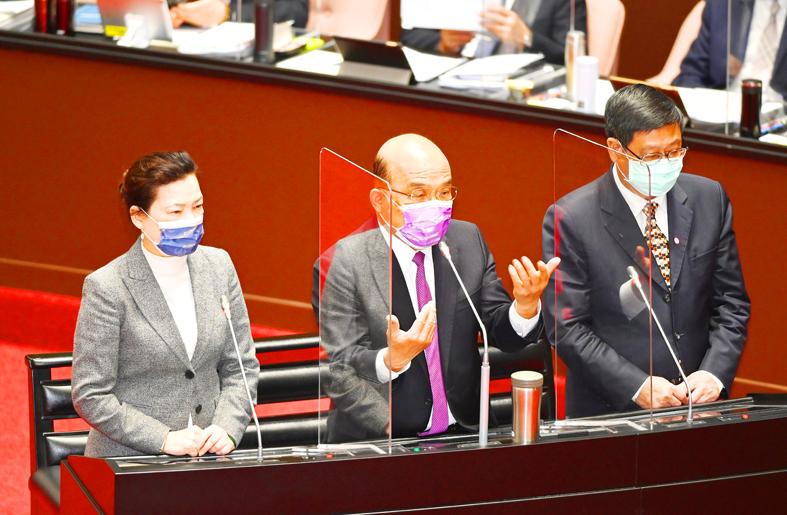Lawmakers should stop treating government officials “like dogs,” Premier Su Tseng-chang (蘇貞昌) said yesterday during a plenary legislative session.
The remark came after the Chinese Nationalist Party (KMT) caucus proposed “banning retorting” from government officials while being questioned by lawmakers at plenary sessions.
KMT Legislator Chiang Wan-an (蔣萬安) during a session on Friday last week asked Su for a promise that there would be no more power outages in Taiwan.

Photo: Tien Yu-hua, Taipei Times
“Your grandfather promised to fight and recover mainland China,” Su said in response.
Su was referring to the alleged family lineage of Chiang as grandson of Chiang Kai-shek (蔣介石).
In yesterday’s session, the KMT caucus asked Legislative Speaker You Si-kun (游錫堃) to rein in government officials from retorting when being questioned by lawmakers, and prohibiting them from asking lawmakers questions in return.
The KMT also called for a bill that would ban retorting.
“We have seen lawmakers in the past heaping abuse and treating government officials like dogs. We should let this behavior remain in the past,” Su told reporters after the session.
“During the plenary session’s question period, lawmakers have the right to query government officials. Lawmakers also have protection under the legislative immunity. Given all these, they still want to amend the law to further protect themselves. People would think these lawmakers are too weak,” Su said.
All ministers and officials wish to explain government policies when being questioned, but they are not given the opportunity, he added.
“Lawmakers often begin questioning with scornful, disparaging remarks, sometimes even with swearing,” he said. “Outstanding professionals in the past have declined Cabinet position offers. A reason often cited was that they were not willing to face abuse and personal attacks by lawmakers.”
“The legislature is our nation’s highest body for elected representatives from all local constituencies, and the best way for lawmakers to do their job is to bolster their own knowledge for questioning officials,” You said in a statement in response to the KMT’s proposal.
“Legislative sessions are for deliberation and oversight on government policies, to discuss and debate between political parties,” You said. “Lawmakers should have a strong ability to respond to retorts by government officials.”

South Korean K-pop girl group Blackpink are to make Kaohsiung the first stop on their Asia tour when they perform at Kaohsiung National Stadium on Oct. 18 and 19, the event organizer said yesterday. The upcoming performances will also make Blackpink the first girl group ever to perform twice at the stadium. It will be the group’s third visit to Taiwan to stage a concert. The last time Blackpink held a concert in the city was in March 2023. Their first concert in Taiwan was on March 3, 2019, at NTSU Arena (Linkou Arena). The group’s 2022-2023 “Born Pink” tour set a

CPBL players, cheerleaders and officials pose at a news conference in Taipei yesterday announcing the upcoming All-Star Game. This year’s CPBL All-Star Weekend is to be held at the Taipei Dome on July 19 and 20.

The Taiwan High Court yesterday upheld a lower court’s decision that ruled in favor of former president Tsai Ing-wen (蔡英文) regarding the legitimacy of her doctoral degree. The issue surrounding Tsai’s academic credentials was raised by former political talk show host Dennis Peng (彭文正) in a Facebook post in June 2019, when Tsai was seeking re-election. Peng has repeatedly accused Tsai of never completing her doctoral dissertation to get a doctoral degree in law from the London School of Economics and Political Science (LSE) in 1984. He subsequently filed a declaratory action charging that

The Hualien Branch of the High Court today sentenced the main suspect in the 2021 fatal derailment of the Taroko Express to 12 years and six months in jail in the second trial of the suspect for his role in Taiwan’s deadliest train crash. Lee Yi-hsiang (李義祥), the driver of a crane truck that fell onto the tracks and which the the Taiwan Railways Administration's (TRA) train crashed into in an accident that killed 49 people and injured 200, was sentenced to seven years and 10 months in the first trial by the Hualien District Court in 2022. Hoa Van Hao, a